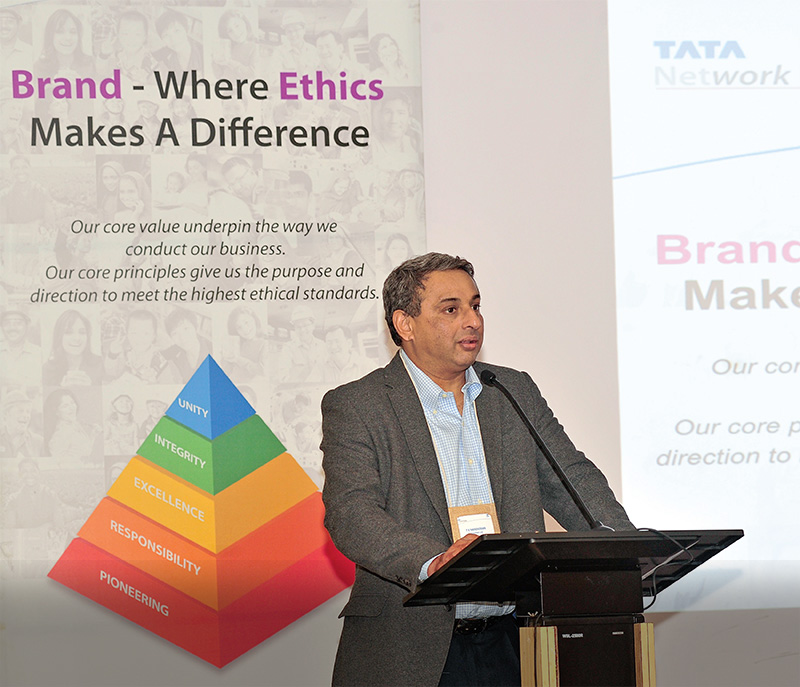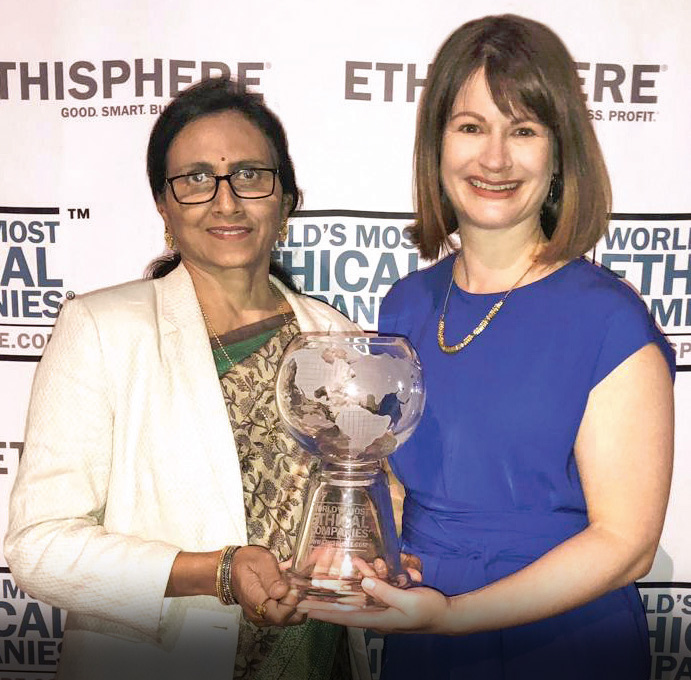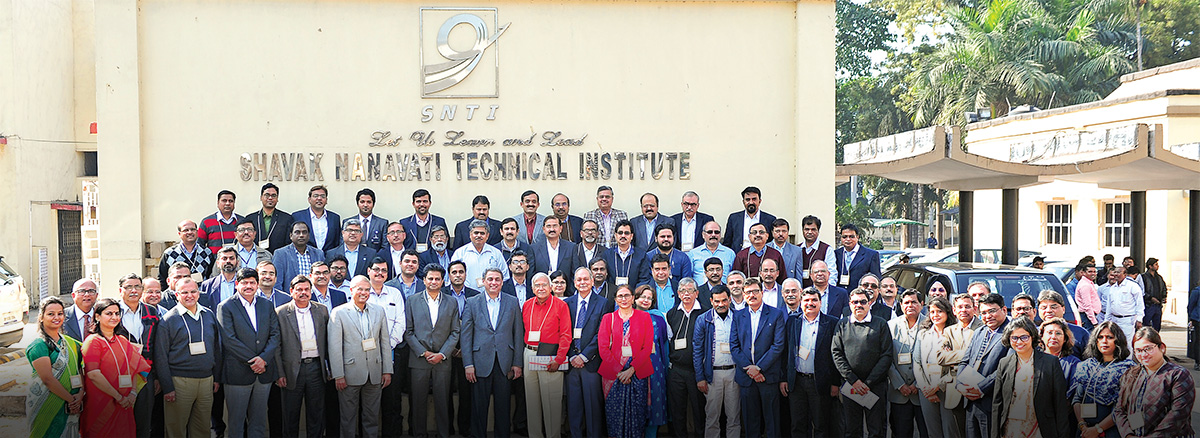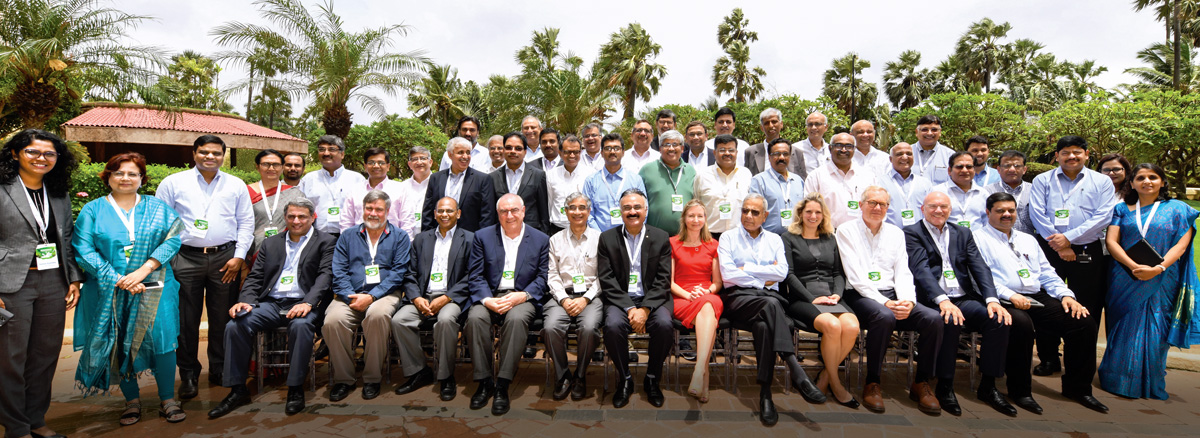 Report Menu
Report Menu
CORPORATE GOVERNANCE
Progressing with integrity

Mr. T. V. Narendran, CEO & MD, Tata Steel and Principal Ethics Officer, addressing the delegates at Tata Network Forum India East - Ethics Conclave FY 2018-19
A benchmark for
business ethics
Recognised as one of the World’s Most Ethical Companies by Ethisphere in 2019, for the eighth time and the only Indian company to win the award in the Metals, Minerals and Mining sector.
Tata Steel embeds the highest standards of governance in its operations, striving to manage its affairs in a fair and transparent manner and create long-term value for all stakeholders. Our focus is not only to follow corporate governance guidelines, but global best practices as well.
The Company has laid a strong foundation for making corporate governance a way of life by constituting a Board, which is active, well informed and independent, using several Board Committees as a mechanism for managing the affairs of the Board.
With regulations becoming more stringent on the domestic as well as international fronts, our policies and the Tata Code of Conduct (TCoC) are implemented to ensure that business is conducted ethically and responsibly, through a well-defined ethical governance framework.
Tata Steel’s rigorous approach to Enterprise Risk Management (ERM) enables the Management to protect and enhance the value of assets, people, performance and reputation. To manage risks throughout our value chain, we have a robust risks management framework in place across the organisation, overseen by the Risk Management Committee at the Board level.
Sustainability is embedded in our business operations. We aspire to be an industry leader in sustainable business practices. To prepare for the future, we are taking steps to reduce our environmental footprint and contribute towards the creation of a circular economy.

World’s Most Ethical Companies Award 2019
Corporate ethics
We, at Tata Steel, are driven by the Group’s core values enshrined in the Tata Code of Conduct (TCoC).
The TCoC is deployed across the organisation through a formalised Management of Business Ethics (MBE) structure, which is built on the foundation of Tata Core Values — Integrity, Excellence, Unity, Responsibility and Pioneering — and functions on the basis of four pillars:
- 1 Leadership Engagement
- 2 Communication and Training
- 3 Compliance Structure
- 4 Measurement of Effectiveness
Leadership Engagement
This pillar focusses on setting up direction, governance structure and role modelling. The Chief Executive Officer and Managing Director is the Principal Ethics Officer of Tata Steel Limited. To ensure adherence to the TCoC, monitor concerns and report compliances, the Principal Ethics Officer appoints the Chief Ethics Counsellor (CEC).
Departmental Ethics Coordinators (DECs) are appointed across the organisation for supporting Management of Business Ethics (MBE) deployment. To increase the involvement of frontline employees (employees + contract employees), a team of ‘Ethics Champions’, who are frontline employees, has also been developed and trained.

Tata Network Forum India East - Ethics Conclave FY 2018-19 Brand where Ethics makes a Difference
Compliance Structure
This pillar focusses on the development and dissemination of policies supporting the TCoC for all stakeholders. All employees are required to read and accept the TCoC and declare their Conflict of Interest (COI) status through the ‘Ethics Compliance Register – DARPAN’, accessible on the Company’s intranet and mobile. To encourage and protect whistle-blowers, the toll-free third-party helpline ‘Intouch’, popularly known as ‘Speak Up’, maintained by an independent UK-based company, has been extended to all stakeholders. The Chief Ethics Counsellor reports the performance of MBE deployment, including TCoC violations, to the Board level (Audit Committee) and Management level committees (Apex Ethics Committee and Ethics Committee).
Policies supporting TCoC:
Whistle-Blower Policy for Directors, Employees and Associates
Receipt of Gifts and Hospitality
Prevention of Sexual Harassment Policy at Workplace and Guidelines
Conflict of Interest Policy
Tata Steel has always been committed to creating a positive business ecosystem in all the spheres it operates. We are in the process of developing the Anti-Bribery & Anti-Corruption and Anti-Money Laundering (ABAC/AML) policy, which will strengthen our internal and external processes against financial risks.
Tab 3
Communication and training programmes have been designed to raise awareness of Tata values, TCoC and ethical policies and practices among all stakeholders. The senior executives communicate on various forums, such as Group Ethics Conclave, Ethics Town Hall and MD Online, to keep up with the ethical benchmark at Tata Steel and its group companies.
For effective dissemination to the frontline and contractual employees, local languages are also used in communications. To help people relate with practical situations, snippet stories, ‘Neeti Katha’, with various dilemma scenarios were introduced. In Financial Year 2018-19, scenarios on ‘The Ethics of Safety’ and ‘Trust Behaviour’ were communicated.
The senior executives communicated with vendors and suppliers during regular Business Associate’s (BA’s) meets/dialogues. They also accept the TCoC and declare their COI during the registration process.
Measurement of Effectiveness
To assess the level of deployment of various MBE initiatives across the organisation, an MBE assessment framework was developed involving site assessment, which resulted in increased cross learnings between DECs and improved MBE deployment. The MBE survey and assessment by the Tata Business Excellence Group were also conducted in Financial Year 2018-19.
In Financial Year 2018-19, we conducted a benchmarking exercise with GoodCorporation and General Electrics, apart from sharing ethical practices in various international forums such as the Business Ethics Leadership Alliance (BELA) summit and the Ethisphere Summit.
Key Performance Indicators Financial Year 2018-19
|
Whistle-Blower Cases* UoM (Nos.) |
|||
|---|---|---|---|
436 |
Received Total |
334 Closed |
102 Open |
|
Sexual Harassment Cases UoM (Nos.) |
|||
|---|---|---|---|
20 |
Received Total |
19 Closed |
1 Open |
|
Training on Ethics UoM (man-hours trained) |
|||
|---|---|---|---|
| Officers 4,003 |
Frontline
Employees 7,080 |
Contract
Employees 23,798 |
Vocational
Training 1,999 |
* exclusive of sexual harassment cases
Corporate sustainability
Tata Steel is committed to incorporating sustainability into all facets of its business, from governance to strategy formulation to execution. The performance related to various sustainability aspects is reviewed at the corporate as well as the Board level.
The scope and membership of Board-level committees has been detailed in the Corporate Governance Report. At the corporate level, various committees review the sustainability and governance initiatives. These include the Apex Safety Committee, Apex Environment Committee, Apex HRD Committee, Apex CSR Committee, Apex R&D Committee and Quality and Production Meeting and Centre of Excellence for GHG emission reduction and mitigation. These Committees are chaired by the Chief Executive Officer and Managing Director or the Executive Director and Chief Financial Officer or Vice President Safety, Health & Sustainability.
The climate change-related risk assessment in accordance with the Task Force on Climate-related Financial Disclosures has been initiated and mitigation strategies will be incorporated subsequently.
Our senior leaders actively engage with various industry bodies such as the World Steel Association, the Confederation of Indian Industry (CII), the Global Reporting Initiative, the International Integrated Reporting Council and the Task Force on Climaterelated Financial Disclosures, guiding the Company further on implementing sustainability practices. Various external assessments such as the Dow Jones Sustainability Index and those conducted by the CII drive improvements in our efforts of embedding sustainability.
Tata Steel has entered into a partnership with the Cambridge Institute for Sustainability Leadership for capability development through an immersion programme for Board Members, Senior Management and Union Leadership.

Sustainability Immersion Programme for Board Members and Senior Leadership by Cambridge Institute for Sustainability Leadership, UK
